Ireland paves way for LGBT-inclusive sex and relationship education in schools
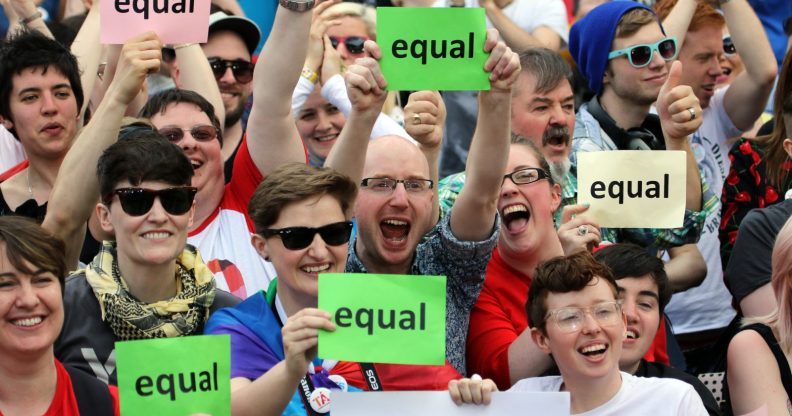
Supporters for same-sex marriage wait for the result of the referendum at Dublin Castle on May 23, 2015 in Dublin. (PAUL FAITH/AFP/Getty)
The Irish government has asked a regulator to draw up guidance for teaching about LGBT issues in relationships and sexuality education (RSE).
The Republic of Ireland’s Education minister, Richard Bruton TD, this week announced a review of the RSE provisions in all schools.
Teaching about sex and relationships has been mandatory in Irish schools since the 1990s, but a committee in the Irish Parliament recently warned that the guidance is badly out of date and requires redrafting.
In response, Mr Bruton this week wrote to the National Council on Curriculum and Assessment to ask it to draw up new guidelines.
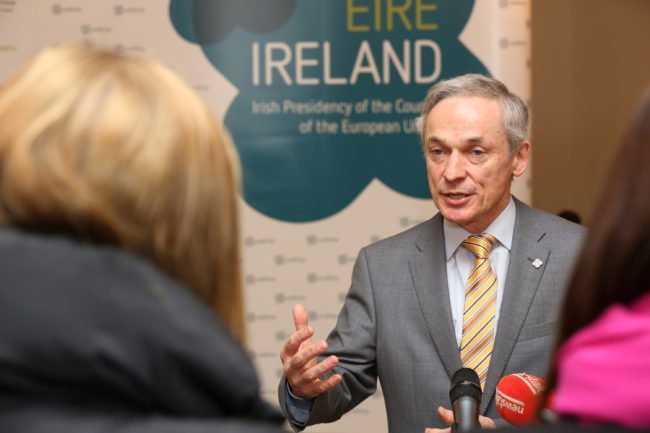
Richard Bruton, T.D (Photo by Mac Innes Photography/The Department of the Taoiseach via Getty Images)
The department says that “LGBTQ+ matters” is one of the specific issues that the minister has asked the body to consider as it modernises the guidelines, as well as consent, social media, the internet and modern contraception.
Minister Bruton said: “Today I am announcing a review of Relationships and Sexuality Education in schools. It is important that we review this area of learning to make sure that we are adequately providing information to students regarding sexuality and relationships through the curriculum.
“I have asked the NCCA to consider the experience and reality of RSE as delivered in schools, the supports and professional development opportunities provided for teachers.
“The RSE curriculum fulfils an important function. Every student has a right to access information about sexual health, relationships and sexuality, and this must be delivered in a factual manner in every school. This review will help to inform decisions regarding the content of the curriculum and how it is delivered.
“I want to ensure that the RSE curriculum meets the needs of young people today, who face a range of different issues to those faced by young people in the late 1990s.”
He added: “This review will also look at the effectiveness of the continuing professional development opportunities which are currently provided to RSE teachers. It is essential for the curriculum to be delivered by teachers who are fully supported and who feel comfortable teaching the curriculum and talking to their students about sexuality and relationships.”
“Through the Parent and Student Charter schools will have to set information for parents regarding RSE. Better communication between parents and schools is a key commitment in the Action Plan for Education, which aims to make the Irish education and training service the best in Europe. Better communication on RSE was a key recommendation in the Chief Inspector’s Report which was published earlier this year.
“In reviewing how RSE is provided in our schools, the views of all of the education partners, recent research outcomes, societal and cultural changes, and existing policies and teaching materials will be considered.”
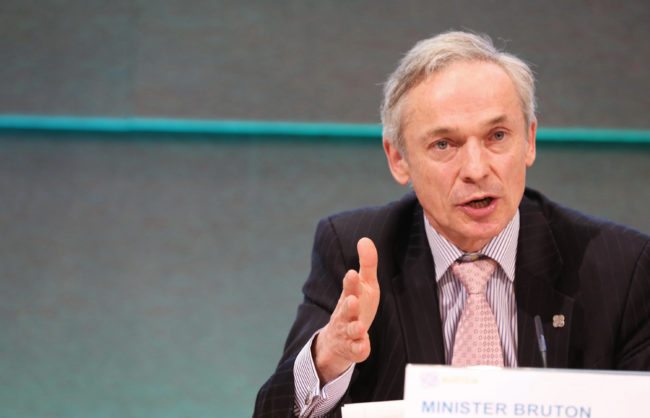
Richard Bruton T.D (Photo by Justin Mac Innes/Mac Innes Photography/The Department of the Taoiseach via Getty Images)
Moninne Griffith, Executive Director of BeLonG To Youth Services, said: “We are delighted that Relationships and Sexuality Education is being reviewed to reflect the needs of young people in Ireland today, including our LGBTI+ young people. For too long information about same sex relationships, safe sex and LGBTI+ matters has been taught in just a small minority of classrooms in Ireland.
“Our young LGBTI+ people have been calling for improvements to sex education for many years now. They are frustrated with the lack of information available to them and eager to see significant improvements. With this review process, we hope that the implementation of RSE will be mandatory for all schools, and that schools will receive the encouragement and support they need to talk about sexuality and relationships.
“Our work with schools and the education sector over the past decade as part of Stand Up LGBTI+ Awareness Week has focused on bringing conversations and information on sexual orientation, gender identity, and equality into classrooms across Ireland.
“In 2017, some 43% of second-level schools nationwide took part in the week-long event. We look forward to the next generation of LGBTI+ young people receiving relevant, realistic information about relationships and sexuality to better equip them for the real world.”
A similar review was launched in the UK last year under former Education Secretary Justine Greening, but after she was sacked by Theresa May, her successor as Education Secretary, Damian Hinds, appeared to walk back a pledge on LGBT-inclusive education.
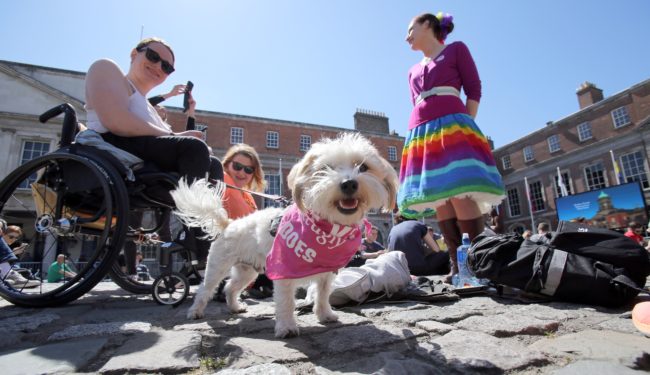
Supporters of same-sex marriage wait for the announcement of the referendum in Dublin castle on May 23, 2015. Ireland appeared to have voted to allow gay marriage today in a historic referendum which would see the historically Catholic country become the world’s first to make the change after a popular vote. (Photo by PAUL FAITH/AFP/Getty Images)
Ireland has rapidly modernised on LGBT rights, following the introduction of equal marriage in and the adoption of a self-identification system of gender recognition.
The country’s current leader Leo Varadkar is one of few openly gay heads of government, and under his leadership Ireland has increasingly led the way on global LGBT issues.
Mr Varadkar recently said gay families should be celebrated on the Pope’s visit to Ireland.
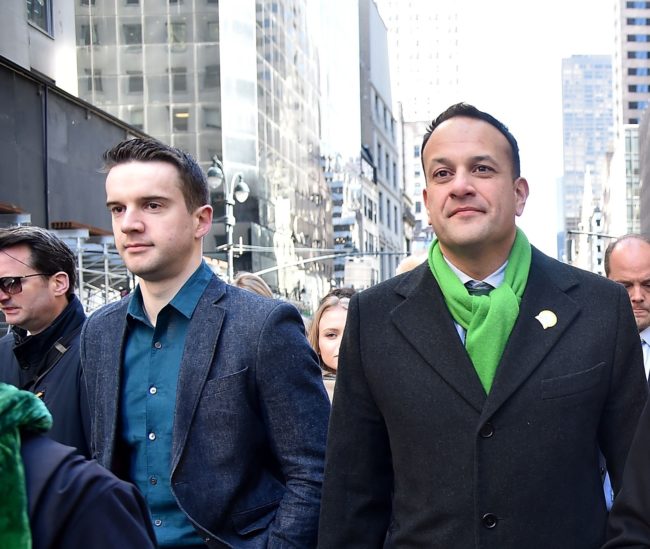
NEW YORK, NY – MARCH 17: Prime Minister of Ireland Leo Varadkar attends the 2018 New York City St. Patrick’s Day Parade on March 17, 2018 in New York City. (Photo by Theo Wargo/Getty Images)
Pope Francis is expected to visit Ireland in August to attend the World Meeting of Families event, a meeting of Catholic activists and preachers that is a keystone in the Church’s global agenda.
The summit has been marred by disputes over LGBT rights, with anti-LGBT Catholic lobbyists forcing organisers to remove all references to homosexuality from booklets produced ahead of the event.
The dispute has become politically charged in Ireland, which takes a progressive stance on LGBT issues that is at odds with the Church’s official stances on gay families.
Speaking in the Irish Parliament Mr Varadkar expressed a hope that LGBT families would also be celebrated at the event.
He said: “The Government is very much of the view that there are many different types of families and that all types should be celebrated, including the traditional nuclear family with the man married to the woman with children, but also one-parent families, families led by grandparents, and families led by same-sex couples.
“We will make it known in our meetings with the organisers that in line with our commitment to personal liberty and equality before the law, the Government’s view is that families in all their forms should be celebrated.”
Mr Varadkar last month marched alongside his partner Matt in New York St Patrick’s Day Parade – which until just a few years ago banned LGBT groups and rainbow flags.
Elsewhere on his trip, Mr Varadkar ended up alone in a room with Mike Pence.
In a break from political convention, media were banned from Vice President’s meeting with Mr Varadkar, who is one of just a few openly gay world leaders.
LGBT rights groups suspect that the reporting ban was put in place by the VP to avoid him being called out publicly on his anti-LGBT record.

